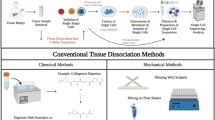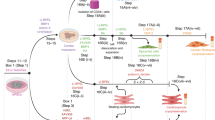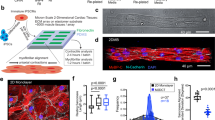Abstract
THE disassociation of cells from various parent tissues by digestion with trypsin has been often applied by workers on tissue cultures1–3. There are, however, several defects in the trypsinization method when the goal is use of the cells for physiological investigations. We have examined various possible methods for avoiding these difficulties and have found that the substitution of collagenase for trypsin satisfied most of our requirements.
This is a preview of subscription content, access via your institution
Access options
Subscribe to this journal
Receive 51 print issues and online access
$199.00 per year
only $3.90 per issue
Buy this article
- Purchase on Springer Link
- Instant access to full article PDF
Prices may be subject to local taxes which are calculated during checkout
Similar content being viewed by others
References
Moscona, A., and Moscona, H., J. Anat., 86, 287 (1952).
Cavanaugh, M. W., J. Exp. Zool., 128, 573 (1955).
Cavanaugh, M. W., and Cavanaugh, D. J., Arch. Intern. Pharmacodyn Therap., 110, 43 (1957).
Kaltenbach, J. P., Kaltenbach, M. H., and Lyons, W. B., Exp. Cell Res., 15, 112 (1958).
Author information
Authors and Affiliations
Rights and permissions
About this article
Cite this article
CAVANAUGH, D., BERNDT, W. & SMITH, T. Disassociation of Heart Cells by Collagenase. Nature 200, 261–262 (1963). https://doi.org/10.1038/200261b0
Issue Date:
DOI: https://doi.org/10.1038/200261b0
This article is cited by
Comments
By submitting a comment you agree to abide by our Terms and Community Guidelines. If you find something abusive or that does not comply with our terms or guidelines please flag it as inappropriate.



